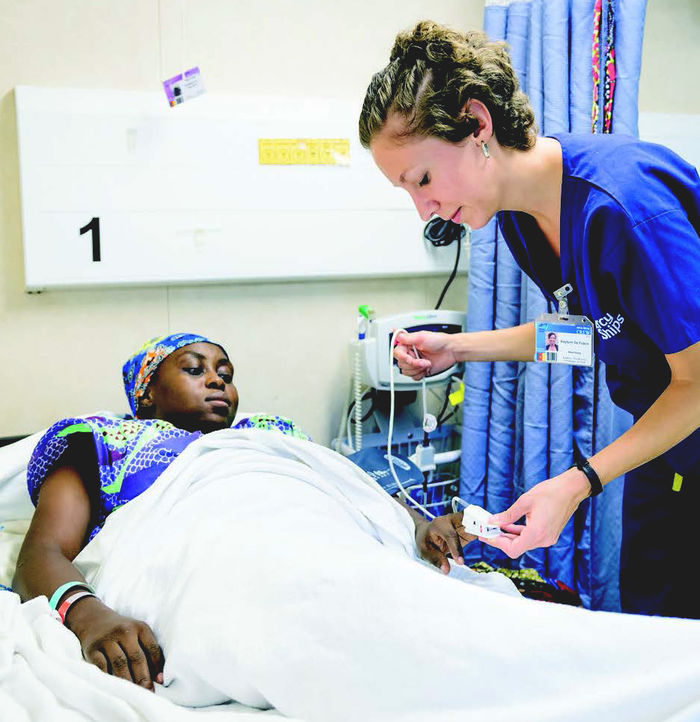Nursing alumna volunteers on floating hospital in Africa
As many as five billion people lack access to safe, affordable surgical and anesthesia services worldwide, and fewer than 6 percent of all operations are performed in the world’s poorest countries.
It’s not hard to understand why. Establishing a sterile surgical center in places such as sub-Saharan Africa is nearly impossible. Lack of access to clean water, reliable electricity, and trained healthcare providers are just three of the myriad challenges to be overcome.
But what if you could bring the hospital to the underserved? Enter Mercy Ships and its 16,500-ton vessel, the Africa Mercy.
Kaylynn DeFusco, a 2010 graduate of Penn State Behrend’s nursing program, recently spent six months working aboard Africa Mercy with 400 other volunteers from forty different countries.
She had learned about Mercy Ships long before she set sail in November. “I first heard about the ships in seventh grade chapel when my high school teacher gave a talk about it,” she said.
Mercy Ships was established in 1978 with the Anastasis. In 2007, it launched Africa Mercy, the largest of the ships operated by the faith-based organization.
DeFusco, a Pittsburgh native, raised funds and took a leave of absence from her nursing job to work on the Africa Mercy.
“God has blessed me with a lot in life, and I wanted to pay that forward,” she said. “It was also a good time in my life to do it as I have some nursing experience under my belt and the scheduling freedom to go.”
She took care of patients who had had hernia repairs, goiter removals, lipoma removals, burn contracture releases, and pediatric cataract removals. But she primarily cared for women who had received obstetric fistula repairs.
A fate worse than death
Obstetric fistulas have been called a fate worse than death for women in developing countries. A complication of prolonged obstructed labor, obstetric fistulas result in a woman’s inability to control her body’s waste-removal functions. She is often rejected by her husband and shunned by her village because of her foul smell and inability to bear more children.
Though virtually unheard of in developed countries and often repairable, obstetric fistulas are sadly common where women don’t have access to safe, affordable surgical care.
Patients travel, often for days or weeks, to the ship, which remains docked in one location for about ten months at a time. The working language of the ship is English, but the patients speak a variety of languages.
“The region we were docked at in Cameroon was mostly French speaking,” DeFusco said. “But patients came from all over the country, and with nearly 275 different ethnic groups, there were several different dialects spoken.”
Translators were available, but DeFusco said few words were needed to understand the needs of her patients and the pain they were experiencing: Compassion and empathy are universal languages for nurses.
Heartbreaking and heartwarming days
Not all of the obstetric fistula surgeries were successful. These were some of the most heartbreaking days on the ship for DeFusco.
Whether the surgery was successful or not, patients in the obstetrics fistula ward were invited to a celebration before they left the Africa Mercy.
“We held a dress ceremony with music, dancing and storytelling,” DeFusco said. “Every woman was given jewelry and a new dress made of vibrant African fabric. It was wonderful to see these women honored and given a platform to speak after years of being ostracized by their own communities.”
Laughter and smiles abound
DeFusco said that despite the seriousness of the mission of the Africa Mercy, the atmosphere onboard is one of hope and joy. Patients often arrive with children in tow.
“In Cameroon, it feels like the entire community takes responsibility for caring for the children, so there were always a lot of kids running around,” she said. “It definitely made me happy to have them there making every situation lighter.”
Mercy Ships says the services it offers can be not only lifesaving but also life changing. DeFusco, who has returned to work as a nurse at the Hillman Cancer Center in Pittsburgh, said that statement holds true for volunteers as well. “It has renewed my desire to nurture an appreciation for life, even in the midst of struggle and sorrow,” DeFusco said.
